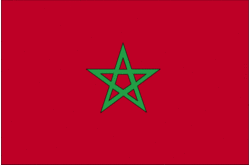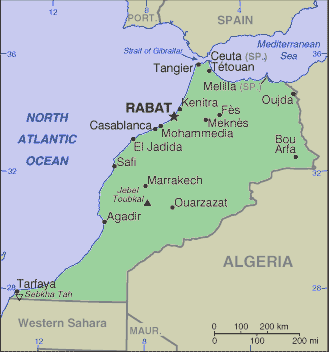Traveling Luck for Morocco. Morocco, Africa
Morocco is located in Northern Africa, bordering the North Atlantic Ocean and the Mediterranean Sea, between Algeria and Western Sahara.
Land in Morocco is northern coast and interior are mountainous with large areas of bordering plateaus, intermontane valleys, and rich coastal plains.
Moroccan land covers an area of 446550 square kilometers which is slightly larger than California
Morocco has borders with Algeria for 1559km, Western Sahara for 443km and Spain for 15.9km.
 Moroccan national flag (Flag of Morocco)
Moroccan national flag (Flag of Morocco)
As for the Moroccan climate; Mediterranean, becoming more extreme in the interior.
Moroccan(s) speak Arabic (official), Berber dialects, French often the language of business, government, and diplomacy.
Places of note in Morocco
- Casablanca
- Rabat
- Fès
- Marrakech
- Agadir
- Tangier
- Meknès
- Oujda
- Kenitra
- Tétouan
- Safi
- Khouribga
- Beni Mellal
- El Jadida
- Taza
- Nador
- Settat
- Larache
- Ksar el Kebir
- Khemisset
- Guelmim
- Berrechid
- Oued Zem
- Fkih Ben Salah
- Taourirt
- Berkane
- Sidi Slimane
- Sidi Qacem
- Khenifra
- Taroudannt
- Tiflet
- Oulad Teïma
- Sefrou
- Youssoufia
- Tan-Tan
 Moroccan map
Moroccan map
Regions of Morocco
- Chaouia-Ouardigha
- Doukkala-Abda
- Fès-Boulemane
- Gharb-Chrarda-Beni Hssen
- Grand Casablanca
- Guelmim-Es Smara
- Marrakech-Tensift-Al Haouz
- Meknès-Tafilalet
- (MO01)
- (MO02)
- (MO03)
- (MO04)
- (MO05)
- (MO06)
- (MO07)
- (MO08)
- (MO09)
- (MO10)
- (MO11)
- (MO12)
- (MO13)
- (MO14)
- (MO15)
- (MO16)
- (MO17)
- (MO18)
- (MO19)
- (MO20)
- (MO21)
- (MO22)
- (MO23)
- (MO24)
- (MO25)
- (MO26)
- (MO27)
- (MO29)
- (MO30)
- (MO32)
- (MO33)
- (MO34)
- (MO35)
- (MO36)
- (MO37)
- (MO38)
- (MO39)
- (MO40)
- (MO41)
- (MO42)
- (MO43)
- (MO44)
- Morocco (general)
- Oriental
- Rabat-Salé-Zemmour-Zaër
- Souss-Massa-Drâa
- Tadla-Azilal
- Tanger-Tétouan
- Taza-Al Hoceima-Taounate
In 788, about a century after the Arab conquest of North Africa, successive Moorish dynasties began to rule in Morocco. In the 16th century, the Sa'adi monarchy, particularly under Ahmad AL-MANSUR (1578-1603), repelled foreign invaders and inaugurated a golden age. In 1860, Spain occupied northern Morocco and ushered in a half century of trade rivalry among European powers that saw Morocco's sovereignty steadily erode; in 1912, the French imposed a protectorate over the country. A protracted independence struggle with France ended successfully in 1956. The internationalized city of Tangier and most Spanish possessions were turned over to the new country that same year. Morocco virtually annexed Western Sahara during the late 1970s, but final resolution on the status of the territory remains unresolved. Gradual political reforms in the 1990s resulted in the establishment of a bicameral legislature, which first met in 1997. Parliamentary elections were held for the second time in September 2002 and municipal elections were held in September 2003.
Moroccan economic policies brought macroeconomic stability to the country in the early 1990s but have not spurred growth sufficient to reduce unemployment that nears 20% in urban areas. Poverty has actually increased due to the volatile nature of GDP, Morocco's continued dependence on foreign energy, and its inability to promote the growth of small and medium size enterprises. Despite structural adjustment programs supported by the IMF, the World Bank, and the Paris Club, the dirham is only fully convertible for current account transactions and Morocco's financial sector is rudimentary. Moroccan authorities understand that reducing poverty and providing jobs is key to domestic security and development. In 2004, Moroccan authorities instituted measures to boost foreign direct investment and trade by signing a free trade agreement with the US and selling government shares in the state telecommunications company and in the largest state-owned bank. The Free Trade agreement went into effect in January 2006. In 2005, GDP growth slipped to 1.2% and the budget deficit rose sharply - to 7.5% of GDP - because of substantial increases in wages and oil subsidies. Long-term challenges include preparing the economy for freer trade with the US and European Union, improving education and job prospects for Morocco's youth, and raising living standards, which the government hopes to achieve by increasing tourist arrivals and boosting competitiveness in textiles.
Moroccan natural resources include phosphates, iron ore, manganese, lead, zinc, fish, salt
strategic location along Strait of Gibraltar
Moroccan religion is Muslim 98.7%, Christian 1.1%, Jewish 0.2%.
Natural hazards in Morocco include northern mountains geologically unstable and subject to earthquakes; periodic droughts.
Travel Advice for Morocco
MoroccoSUMMARY
- There is a high threat from terrorism in Morocco. A series of terrorist attacks took place on 16 May 2003 in Casablanca.
- Morocco has a poor road safety record. Accidents are frequent, especially on busy major routes. The main road from Agadir to Marrakesh via Imi’n Tanoute and Chichaoua has been reported as particularly hazardous.
- If you are travelling to Western Sahara, please see our separate Travel Advice covering this disputed territory.
- Around 200,000 British nationals visit Morocco each year. Most visits are trouble-free. The main types of incident for which British nationals require consular assistance in Morocco are for replacing lost and stolen passports. There are occasional incidents involving theft at knifepoint in the major cities and along beaches, violent crime, though not a major problem in Morocco, is growing.
- We strongly recommend that you obtain comprehensive travel and medical insurance before travelling. You should check any exclusions, and that your policy covers you for the activities you want to undertake. Please see: Travel Insurance.
SAFETY AND SECURITY
LOCAL LAWS AND CUSTOMS
ENTRY REQUIREMENTS
HEALTH
GENERAL
When insuring your vehicle, it is advisable to choose a company with a local representative.
OTHER

 Search
Search Morocco country profile
Morocco country profile Travel advice for Morocco
Travel advice for Morocco